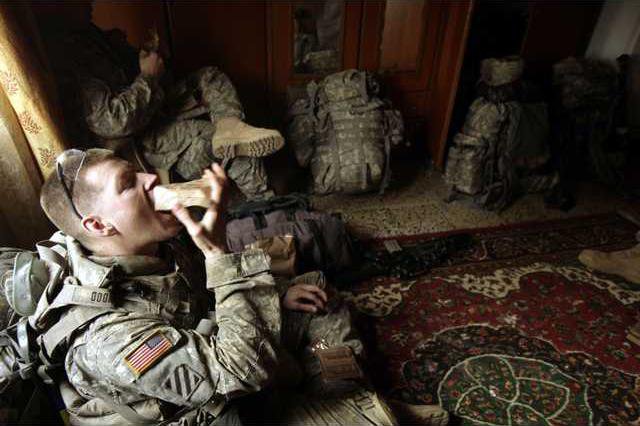BAGHDAD - The U.S. military worried Sunday about "mixed messages" from Iran, listing a dramatic drop in Iranian-made weapons reaching Iraq but no reduction in the training and financing of Shiite militants.
The report card further muddles U.S.-Iranian relations as Washington ratchets up its anti-Tehran rhetoric in the shadow of a recent intelligence report that the Islamic Republic halted a nuclear weapons program four years ago.
A second suicide bombing in two days, meanwhile, killed six people in Anbar province, birthplace of the Sunni movement against al-Qaida in Iraq that has been a major factor in a recent downturn in nationwide violence.
The apparent target near Fallujah was a U.S.-backed Sunni tribal sheik who escaped harm, but the bombing reflected the difficulty in routing insurgents led by al-Qaida in Iraq even in areas where the military has made major gains.
Rear Adm. Gregory Smith, a U.S. military spokesman in Baghdad, said attacks using powerful Iranian-made bombs known as explosively formed penetrators, or EFPs, have fallen off in recent days after a sharp but brief increase in the first half of the month.
Late last year, the military said the flow of EFPs into Iraq had slowed, but Gen. David Petraeus, the top U.S. commander, said last week that attacks with the weapons had risen by a factor of two or three in the first half of this month.
Smith said the increase fell off again last week.
"The number of signature weapons that had come from Iran and had been used against coalition and Iraqi forces are down dramatically except for this short uptick in the EFPs in the early part of January," Smith said at a news conference.
"There was an increase, we don't know why precisely," he added. "There was an increase clearly of that weapon and now they've returned to normal levels."
Smith said the U.S. is trying to understand the various ways in which Iran exerts influence inside Iraq, including training of and financial support to militias as well as the smuggling of weapons.
"We don't think that the level of training has been reduced at all. We don't believe that the level of financing has been reduced. It's uncertain again what is happening in Iran that's leading to that occurrence."
The remarks were the latest in the verbal sparring between the two rival countries as Washington accuses Iran of fueling the violence in Iraq by funding and arming Shiite militias. Tehran denies the charges and says it wants only to stabilize its fellow predominantly Shiite neighbor.
The push to contain Iran has been given new urgency by a Jan. 6 incident in the Persian Gulf in which U.S. warships were harassed by the Iranian naval speedboats in the Strait of Hormuz.
President Bush also has been trying to maintain pressure against Iran despite a U.S. intelligence finding that Iran had stopped a secret nuclear weapons program in 2003 — contradicting White House claims that Tehran was still pursuing such arms.
During a Middle East tour, he told Sunni Arab leaders worried about Iran's ambitions for regional power that "all options are on the table" for dealing with the continuing threat from Tehran but that "I'd like to solve this diplomatically."
The bomber in Anbar province detonated his explosive belt after four guards stopped him at the checkpoint leading to the sheik's farm near Fallujah. The attack killed the four guards and two civilians and wounded four others, according to a police official, who spoke on condition of anonymity because he feared reprisals.
The sheik, Aeifan al-Issawi, is a leading member of the Anbar Awakening Council.
The attack came one day after three suicide bombers targeted a police station in Ramadi, the provincial capital of Anbar and a former Sunni insurgent stronghold. Guards killed one attacker, but two others detonated their explosives at the entrance, killing at least five officers, authorities said.
Smith said the military had al-Qaida on the run with recent operations. But he warned the group remains a force in eastern Anbar, northeast of Baghdad in Diyala province, in areas surrounding the northern city of Kirkuk, "in small numbers to the south of Baghdad" and in the northern city of Mosul.
"Mosul will continue to be a center of influence for, a center of gravity for al-Qaida because of its key network of facilitation — both financing and foreign fighters," he said. "The flow to Mosul is critical for al-Qaida in Iraq."
He said 121 militants had been killed, including 92 so-called "high-value targets" and 1,023 detained since the most recent operation against them began on Jan. 8.

